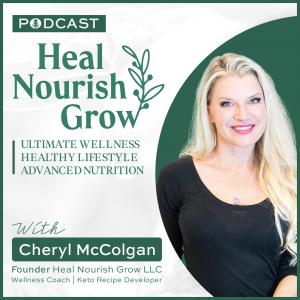Heal Nourish Grow Podcast

Overcoming Emotional Eating Using "HANG"
In this episode, Renee Jones shares her weight loss journey and techniques she found to deal with emotional eating. Renee shares her background of yo-yo dieting and her eventual discovery of emotional eating as the root cause of her struggles. She explains how she found what works for her body through a specific software program and emphasizes the importance of an individualized approach to weight loss. She provides practical tips for overcoming emotional eating and maintaining weight loss, including the HANG acronym for addressing emotional hunger. She also shares the role of coaching in helping others resolve emotional issues and live authentically. Connect with Renee at PackYourOwnBag.com. Takeaways Emotional eating is eating for any reason other than hunger, and it often involves using food as a way to soothe or cope with emotions. Finding what works for your body is crucial for successful weight loss and maintenance. It requires self-reflection, experimentation, and paying attention to how different foods and eating patterns make you feel. Practical tips for weight loss include facing your emotions instead of using food as a coping mechanism, creating rules and boundaries around food and finding alternate activities or behaviors to replace emotional eating. Coaching can be a powerful tool for weight loss and personal growth, helping people resolve emotional issues and live more authentically. Watch the episode on YouTube https://youtu.be/EQas2BWFhzs Podcast Chapters 00:00 Introduction and Background03:20 Discovering Emotional Eating06:32 Finding What Works for Your Body09:29 Practical Tips for Weight Loss16:21 Replacing Unhealthy Behaviors18:54 Renee's Coaching Approach23:14 The Power of Authenticity24:07 Getting in Touch with Renee Podcast Transcript Cheryl McColgan (00:00.874)Hey everyone, welcome to the Heal Nourish Grow podcast. Today I am joined by Renee Jones and we are going to talk about something that's a very popular topic at the beginning of the year and that is weight loss. Renee has had a very interesting background as you heard in her bio, but now I'm gonna let her share in your own words, Renee. How did you get into this work and kind of, but maybe start with the background. I think you said for 40 years, you were kind of just like yo-yoing around. So I'm really curious to hear about your backstory, like what sort of things you tried, what were your challenges. So I'll let you take it away with your introduction to your history there. Renee Jones (00:37.652)Okay, well, thanks for having me for a start. But my first diet was when I was 10, and I know that sounds awful, but my mother thought, you're a bit young, but if we start now, maybe you'll learn how to do this. And the problem was, I didn't know what I was doing. She'd been heavy all her life, so she didn't know what she was doing. Cheryl McColgan (00:49.902)I'm sorry. Renee Jones (01:02.192)And we sort of would start and stop and then we'd say, oh, do you want to do the diet again? Yeah, okay. And we'd start over again. And it would go for a while until we either got fed up or went somewhere, you know, either visiting family or holiday or something like that. And it, you know, it just went on. I didn't learn how to first believe that I could keep the weight off that I lost. but also what was really good for my body. It was usually sort of a whatever the diet of the day was. So I think we tried them all, honestly. I think there are two diets I have not tried. And one of them was that HCG thing. And the other is the Whole30. Cheryl McColgan (01:50.499)Mm-hmm. Renee Jones (01:55.636)Because I've done something close enough to that. I thought, got the idea. I'm good. But that just went on. Cheryl McColgan (01:55.992)Yes. Cheryl McColgan (02:00.114)Right. So out of those ones, and so out of those ones that you tried, you never really found, I mean,






 Visit Podcast Website
Visit Podcast Website RSS Podcast Feed
RSS Podcast Feed Subscribe
Subscribe
 Add to MyCast
Add to MyCast